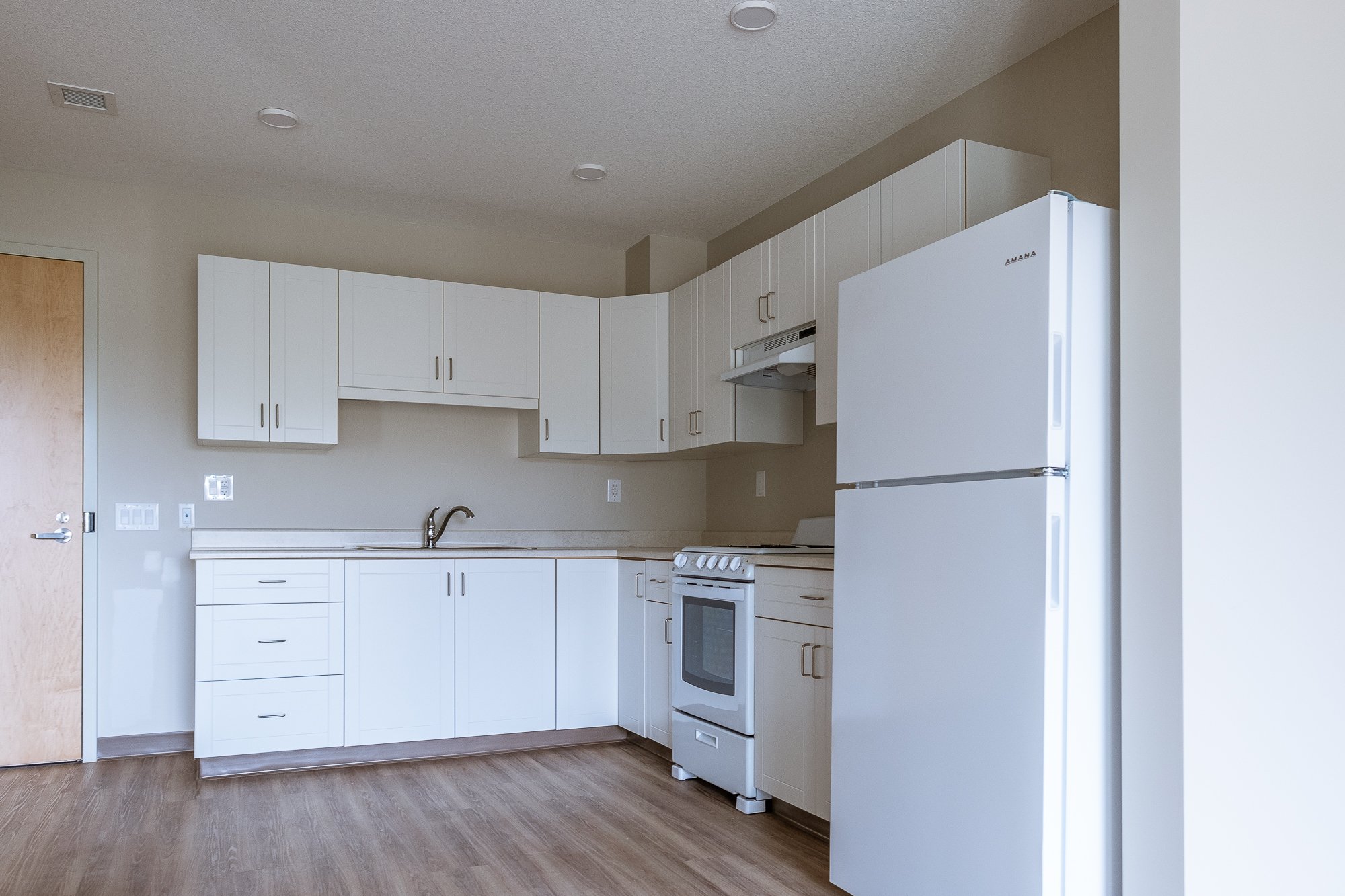Supportive Housing
NiGiNan Housing Ventures currently runs four supportive housing developments in Edmonton.
What is Supportive Housing?
Supportive housing provides a permanent home to people that are unhoused in Edmonton. It is not a shelter, drop-in, halfway house, or any other type of temporary accommodation but long-term housing where residents sign a lease and pay subsidized rent. By using a housing-first approach, individuals who are unhoused will find their basic needs met - safety, dignity and stability. This will enable them to reconnect with their family and culture, and connect with critical resources and support.
What makes Niginan’s approach different?
Cultural Supports
Residents are assisted from a decolonized lens, through cultural teachings and supports such as daily smudges, weekly sweats, and seasonal harvesting activities.
In-House Managed Substances Support Programs (MAP* & MCP*)
Residents opt into the program and set personal goals to use in a safer way. Alcohol and cannabis are purchased by residents and dispensed by staff according to agreed upon dosage and schedule.
*MAP: Managed Alcohol Program / MCP: Managed Cannabis Program
Stabilization
Residents can stay in their space 24/7 and are provided three meals per day. This allows people to focus on their future, rather than just survival. It also allows staff to build relationships and assess needs and offer supports.
Indigenous-led Recovery Model
Minimizing harm by meeting residents’ needs without judgement. Following evidence-based research to reconnect residents to culture, family, and healing.
Sites and Programs
NiGiNan manages a portfolio of 234 units across 8 properties and has housed over 600 individuals since our first building opened in 2014. These properties include Ambrose Place, Omamoo Wango Gamik, McArthur Place, Pimatisiwin, and four group homes under the Persons with Developmental Disabilities (PDD) program.
NiGiNan practices a decolonized approach to housing services which recognizes the importance of culture and Ceremony, people-first relationships, Land, community care, and lived experience.
Learn more about the housing developments where our team provides support for hundreds of people in our city:
Each of our sites are unique, and include features such as:
Large hallways
Built in hotbox
Ceremonial space
Low barrier rooms
Accessible suites
Commercial kitchen
Nutritionist-informed menu
Craft Room
TV Room
Triage Room
Secured entrance into facility
Video cameras throughout
Open sight lines
NiGiNan provides a full spectrum of housing options; including short-term stabilization spaces, permanent supportive housing, group homes, and independent living. Individuals are assessed to determine which site best suits their needs. Residents can also move between different NiGiNan sites, if needed. We help people where they are and help them build to where they want to be.
Across all of NiGiNan‘s sites, residents have their own private space, pay rent, and have access to programs and services. This gives people a connection to ownership of space and also supports their personal agency.
Why our approach is needed
Limited Options
Few supportive housing options are delivered from a cultural context, are trauma informed, and follow an Indigenous-led recovery model.
NiGiNan provides culture, healing and connection through its supportive housing developments.
Houselessness Prevalence
Over 2,800 individuals in Edmonton are currently unhoused and do not have their basic needs met. Over 58% identify as Indigenous.
Our Housing First approach helps to meet the basic needs of unhoused people and has a higher long-term success rate.
Systemic discrimination
Many unhoused people cannot access resources and supports to improve their situation.
Our supportive living developments create a safer, more stable home for residents to access necessary services.
Inconsistent Care
Inconsistent medical and mental health resources, as well as a lack of supports and resources makes healing difficult.
NiGiNan’s supportive housing creates a more consistent environment for residents to heal.
“We can end homelessness by providing the right types of housing and the health and wellness supports that folks need. Our most urgent need is supportive housing, which provides folks a permanent home in a multi-unit building combined with on-site health and wellness support. At Ambrose Place [NiGiNan] in McCauley, we have one of the best examples of supportive housing in Edmonton, with a high level of support available to residents to help them maintain their housing.”
Supportive Housing Success Statistics
Our approach and developments are proven to reduce the use of Emergency Medical Services (EMS), hospitalizations, involvements with police and justice system, community encampments, and drug and alcohol intake in our community.
↓ 61%
emergency room visits per resident per year
↓ 40 to 14
hospital inpatient days per person per year
$480,000
overall annual savings for police and justice systems




